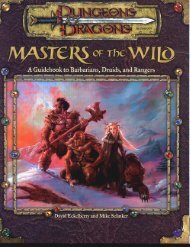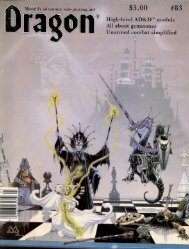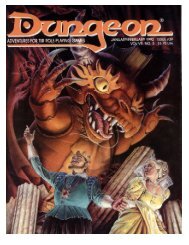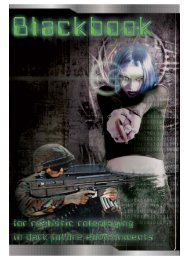Accessory - Dragon Magazine #111.pdf - Index of
Accessory - Dragon Magazine #111.pdf - Index of
Accessory - Dragon Magazine #111.pdf - Index of
You also want an ePaper? Increase the reach of your titles
YUMPU automatically turns print PDFs into web optimized ePapers that Google loves.
Jones’s best efforts to recruit Ozark as a<br />
Federation member (the Federation would<br />
dearly love to acquire some <strong>of</strong> the Ozarkers’<br />
magical skills), the planet’s citizens stubbornly<br />
refuse to join.<br />
The contrast between Tri-Galactic<br />
“psience” and Ozarker magic is intriguingly<br />
drawn, and Elgin’s story moves at a<br />
satisfying pace. But Coyote Jones and<br />
Ozark’s Responsible <strong>of</strong> Brightwater have<br />
both been protagonists in their separate<br />
adventures, and setting them against each<br />
other makes for an unsettling conflict in<br />
which neither really wins.<br />
On one level, that’s the stuff <strong>of</strong> good<br />
literature — and there are a number <strong>of</strong><br />
hints and suggestions that Elgin knows<br />
exactly what she is doing with the social<br />
issues she raises. Those issues, plus at least<br />
one glaring loose end involving a smuggled<br />
Bible, virtually demand a sequel.<br />
But on another level, fans <strong>of</strong> the earlier<br />
Jones and Ozark tales may have a right to<br />
feel a bit cheated. Both series have been<br />
praised as clever and humorous adventures<br />
in a lighter vein, and while this newest book<br />
keeps to the same general tone, it is very<br />
definitely trying to be something slightly<br />
different. Elgin’s intentions may be good,<br />
but it may take another book before her<br />
readers are convinced that the shift in mood<br />
is justified.<br />
WITCH BLOOD<br />
Will Shetterly<br />
Ace 0-441-89644-8 $2.95<br />
According to the new Oriental Adventures<br />
rules for the AD&D® game, martial<br />
artists (better known as monks) don’t belong<br />
in traditional Western-style campaigns.<br />
Though it’s probably true that monks lit<br />
best in Oriental surroundings, one need<br />
only read Witch Blood to learn that they<br />
can be highly effective in the more familiar<br />
worlds <strong>of</strong> medieval fantasy as well.<br />
As a young boy, Rifkin is chosen by<br />
wandering disciples <strong>of</strong> the Warrior Saint to<br />
learn the disciplines and skills <strong>of</strong> the martial<br />
arts. This involves lengthy schooling in a<br />
lonely mountain retreat, and the descriptions<br />
both <strong>of</strong> this place and the craft it<br />
teaches mark Rifkin as a monk <strong>of</strong> no small<br />
ability. The main story, however, is set in a<br />
crumbling castle that is home to a besieged<br />
band <strong>of</strong> outcast witches, and echoes strongly<br />
<strong>of</strong> eastern Europe.<br />
Not surprisingly, Rifkin is himself a<br />
wanderer, and it is by accident that he<br />
enters the valley <strong>of</strong> Castle Gromandiel. His<br />
martial powers enable him to defeat the<br />
huge bear that serves as one <strong>of</strong> the witches’<br />
guardians, and in return for the slaying<br />
Rifkin agrees to serve Naiji, the castle’s<br />
mistress.<br />
From that point on, Witch Blood piles<br />
mystery upon intrigue. There are spies<br />
among the castle staff and ninja-like master<br />
assassins in the woodwork. More prosaic<br />
political struggles pit Count Talivane Gromandiel<br />
against a neighboring duke, and<br />
eventually find the castle literally under<br />
36 JULY 1986<br />
siege. Stranger yet, Rifkin displays an<br />
inexplicable affinity for magic that only<br />
explains itself when a part <strong>of</strong> his past unexpectedly<br />
catches up with him.<br />
Though Rifkin is usually a strong defender<br />
<strong>of</strong> honor, he is far from being pure <strong>of</strong><br />
mind and not above devious maneuvering<br />
when it suits his purpose. Will Shetterly<br />
does a dextrously detailed job <strong>of</strong> sketching<br />
Rifkin’s personality and provides a sharpeyed<br />
but ascetic tone to the narration that<br />
perfectly understates the dark atmosphere <strong>of</strong><br />
the tale. The prose style is markedly different<br />
from Shetterly’s previous novel, Cats<br />
Have No Lord, demonstrating versatility as<br />
well as substantial talent. Only in the very<br />
last line does he slip slightly out <strong>of</strong> character,<br />
and then only to foreshadow a sequel.<br />
For the promise <strong>of</strong> another story about<br />
Rifkin Wanderer, that moment <strong>of</strong> flippancy<br />
is easily forgiven.<br />
THE CROSS-TIME ENGINEER<br />
Leo Frankowski<br />
Del Rey 0-345-32762-4 $2.95<br />
A healthy percentage <strong>of</strong> AD&D® gamers<br />
raise strenuous objections to any introduction<br />
<strong>of</strong> technology or advanced science into<br />
the medieval setting <strong>of</strong> the game. While the<br />
world <strong>of</strong> The Cross-Time Engineer lacks<br />
the counterbalancing element <strong>of</strong> magic, it<br />
still <strong>of</strong>fers skeptical players and referees a<br />
well-reasoned response to those objections,<br />
and does so with a remarkable style combined<br />
with a touch <strong>of</strong> cheerful irony.<br />
Leo Frankowski’s novel (the first <strong>of</strong> four)<br />
uses a familiar premise: Conrad Schwartz,<br />
a near-future engineer on a hiking trip, is<br />
accidentally thrown backward to a pretechnological<br />
time. But there are numerous<br />
twists in the concept, all important to the<br />
novel’s development. Conrad is Polish, and<br />
conveniently lands in Poland in the year<br />
1231 — just ten years before the country is<br />
due to be wiped out by a Mongol invasion.<br />
Trapped in the thirteenth century, he decides<br />
to do the patriotic thing: industrialize<br />
Poland and prepare to thwart the Mongols.<br />
And just to make matters more interesting,<br />
Conrad is a confirmed socialist.<br />
To add a hint <strong>of</strong> mystery to this otherwise<br />
straightforward scenario, Frankowski adds<br />
occasional interludes to the story in which<br />
observers from Conrad’s time comment on<br />
his progress. Though they provide Conrad<br />
with the means to begin his campaign, their<br />
roles aren’t fully defined. Clearly, future<br />
volumes will twist in unexpected directions.<br />
Frankowski’s prose is smooth and wryly<br />
humorous, and his research has clearly been<br />
thorough. Aside from the potential timetravel<br />
paradoxes, the plot holds few surprises,<br />
but that isn’t really a valid criticism.<br />
Rarely has unabashedly historical science<br />
fiction been this much fun, and readers<br />
should be eager to collect future books and<br />
find out whether Conrad really can get a<br />
live-hundred-year start on the industrial<br />
revolution.<br />
THE UNICORN QUEST<br />
John Lee<br />
Tor 0-812-54400-5 $2.95<br />
The title <strong>of</strong> this novel is an accurate (if<br />
rather abbreviated) description <strong>of</strong> its contents,<br />
which, in a year overrun with books<br />
about dragons, initially sounds like a promising<br />
change from the norm. Unfortunately,<br />
too much <strong>of</strong> John Lee’s tale is vague and<br />
rambling, and the parts that aren’t owe<br />
entirely too much to certain <strong>of</strong> the dragon<br />
stories.<br />
There has been a war going on for a very<br />
long time in the Strand — a war between<br />
kingdoms whose civilization is based on<br />
magic and mysterious alien Others with<br />
awesome technological weapons. Indeed, it<br />
appears that the Others may finally win<br />
unless two young people (one an aspiring<br />
mage, the other the daughter <strong>of</strong> a noble<br />
house) can manage to fulfill a prophecy<br />
uttered out <strong>of</strong> the blue.<br />
It might have been a successful plot. But<br />
the war takes place almost entirely <strong>of</strong>fstage<br />
so that there is very little sense <strong>of</strong> tension or<br />
<strong>of</strong> a genuine threat, and the basis <strong>of</strong> the<br />
conflict — revealed at the very end <strong>of</strong> the<br />
book — has nothing to do either with unicorns<br />
or with the human civilization, for the<br />
most part. As for the protagonists Jarrod<br />
and Marianna, Lee sets up the expected<br />
romance almost at once, then puts it on<br />
hold for the sake <strong>of</strong> the old convention<br />
about unicorns favoring virgins — only to<br />
set it back on track again late in the novel.<br />
Odder still, Lee gives the unicorns very<br />
little to do beyond standing around and<br />
looking impressive. Though they do possess<br />
magical power needed to combat the Others,<br />
their mere presence is apparently<br />
enough to turn the tide. And Lee’s unicorns<br />
have both telepathic powers and the ability<br />
to teleport through something called Interim<br />
— abilities that give them an







